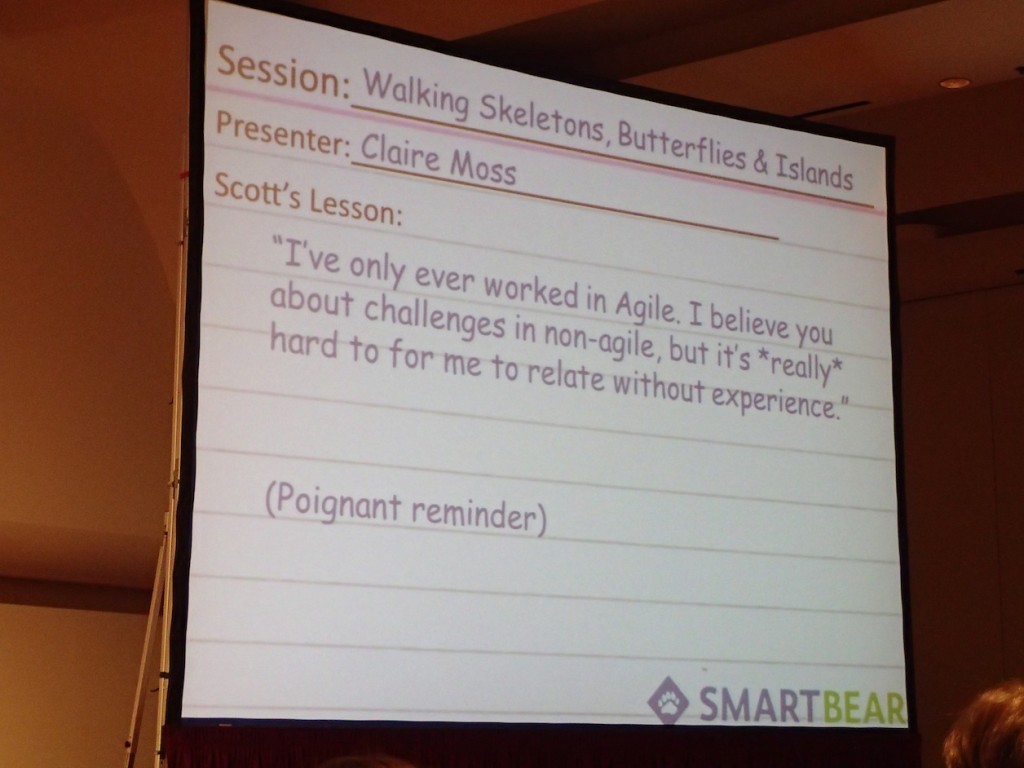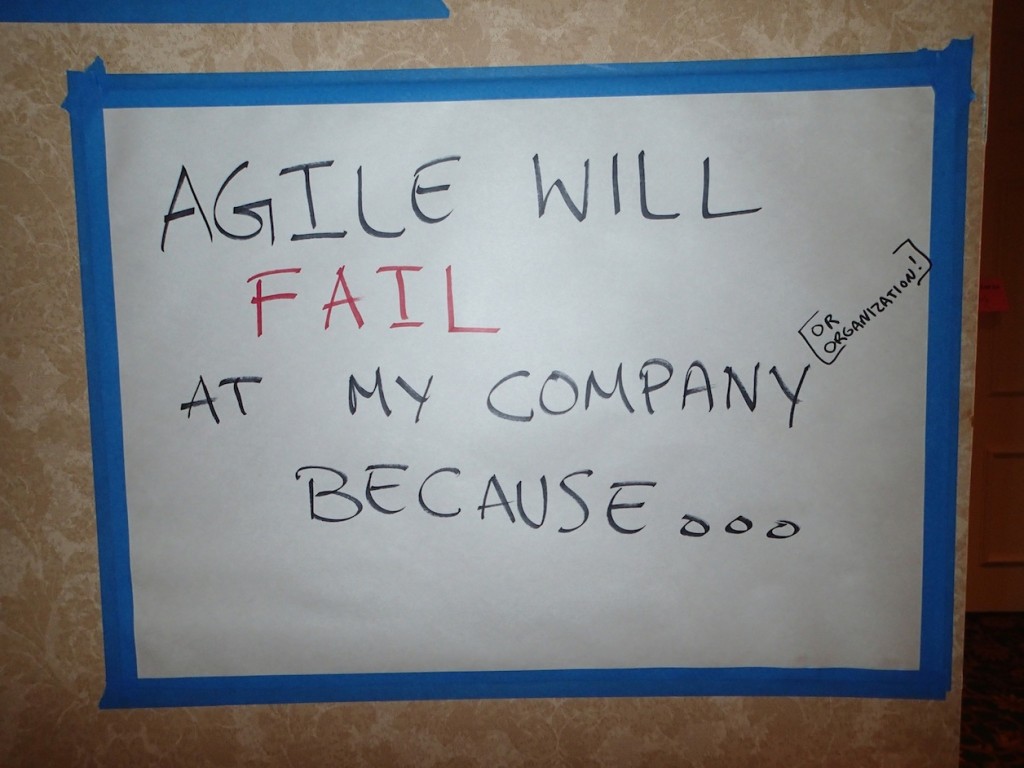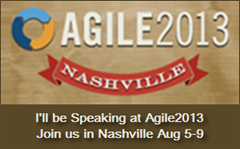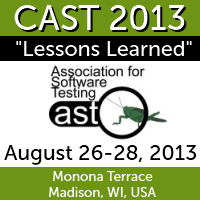The closing keynote at CAST 2013 was Scott Barber and Rob Sabourin describing takeaways from each of the talks of the conference, bringing together many different talks into themes or striking moments. As a speaker, I was on tenterhooks waiting to find out what Scott would say about my talk. It was not what I expected, a moment from before my talk that he described as a “kick to the head” (in a good way):

He pointed out that I was emphasizing empathizing with people with different experience and perspective, which was important enough to say explicitly before I began my talk. So with that in mind, I want to talk about a foreign perspective I encountered at my other software conference of the year.
At Agile2013, someone taped large sheets of sketch paper to the wall with a large writing prompt:
to which many people replied in various ways during the week. Some of these responses were rebellious, resisting the seeming prophecy of failed agile. Others felt trapped by unresponsive or rigid organization behavior and hierarchy, industry regulation, or even customers. Contributors felt that companies with only a shallow understanding of agile or simply name-only “implementation” had no real difference in the way of working. Culture weighed heavily on the minds of attendees: belief, passion, desire, emotion, infighting, courage, trust, support, motivation, thinking. So people problems were at the heart of most expectations of failure.
To me, the most provocative perspectives I saw on that wall were not focusing on agile but on the demonstrated value delivered through whatever works, focusing on outcomes. Today, a friend pointed out a Mike Cottmeyer article from 2009 that discussed defining value in agile but at the enterprise level in terms of real business outcomes:
As an organization, we know that we need to deliver value as fast as possible… but we can’t figure out how to apply the small team concepts to our particular business problems. That’s why you get the classic “agile will never work here” comments. There is an inherent disconnect between the team level guidance agile methodologies talk about and the bigger concerns your senior executives are struggling with. There is a gap between value at the team level and value at the enterprise level.
Four years later, Agile2013 conference attendees are still wrestling articulating delivery of complex business objectives to business leaders. And while I also struggle with messaging how my work provides value to the enterprise, I’ve never experienced an agile transformation and so it hadn’t occurred to me to wonder whether agile could succeed. It’s always been business-as-usual, in my experience.
The full (transcribed) list from the Agile2013 wall:
- We think we are “Agile”
- The concept of “dedicated to one task at a time” is not supported!
- They won’t change
- Response: “They”? Maybe this is contributing to the problem
- Because CEO manages with fear and intimidation
- … Only focused on changes in development teams; not looking at whole value stream (product ideation & management)
- No buy-in from the business
- Duplicitous product owners (two masters)
- because of our culture
- Response: √
- because my customer prefers waterfall…
- Because the company wears “agile” as a label and yet does nothing to remove the bureaucracy and obstacles teams face daily while trying to implement agile.
- Response: √
- We lose trust in each other
- … Adoption is done because of convenience not because of conviction.
- We are different
- Response: … Just like everyone else who has done it.
- XP NOT DEAD!
- Our egos are bigger & more important than the company goals
- A re-org will set us back to the beginning, again and again. (weekly)
- Response: √
- Of me.
- …Insufficient support from leadership
- Response: Totally agree
- Different part of the biz use different types of agile
- Deeply hierarchy…. Project leader doesn’t want Agile.
- my leadership team no longer believes in it 🙁
- … it’s counterintuitive & hard to practice
- Because agile is a state of being… NOT doing! Agile is grossly misunderstood… SADLY!
- … because Agile is not the goal. Agile is simply a MEANS to and END
- Response: Agree!
- We only fund CAPITAL projects
- Because I just think on the consequence not the cause. We should be able to teach the noble truth behind agile methods. Teach that discipline is not a fantasy. If we try hard as a team we can achieve anything. – She Liang
- My manager has to assign work to the team
- It does not support SECURE software (ISO27000 or code analyzers)
- They don’t want to change. & no lean leadership.
- Too much focus on the mechanics of the process. Not enough on the motivation/passion behind it.
- Response: +1
- We have not explained the ‘why’
- Not everyone on our team understands it.
- It won’t, because I work at Rackspace! 🙂
- “Lack of Courage…”
- We don’t want it badly enough
- Because I’m writing on this wall & I think it will so it will
- We can’t show the value
- “What we do already works!?”
- Crash at current (complex) business model
- Jim
- Strong and growing PMO traditional structure being instituted
- We don’t think by ourselves. We need to think everyday, every time, everywhere!
- Response: Agreed.
- Our culture won’t *change*
- Response: √
Q: Maybe someone can clarify that business model remark for me? I wasn’t quite sure what that said…



